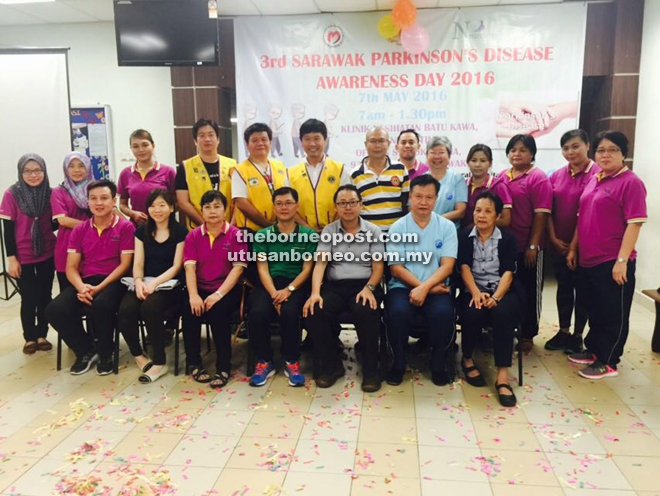
Sarawak Parkinson’s Disease Awareness Day organising chairperson Dr Law (seated centre), with other members of the organising committee during a photo call after the event held here recently.
KUCHING: The third Sarawak Parkinson’s Disease Awareness Day was held here recently to heighten public awareness on the disease and the various treatment and supportive care available to them.
Organised by Neurology Unit of Sarawak General Hospital (SGH) with support from Lions Club of Kuching-Kota Samarahan (as co-sponsor), the programme themed ‘Understanding Parkinson’s Disease – It Makes Sense’ aimed to increase the awareness and understanding of the disease, so that early symptoms can be identified for prompt treatment.
The Parkinson support group, which was set up in Kuching in 2015 and Sibu the previous year, is led by a generous Parkinson’s patient who has devoted time and resources, including offering her own house as a venue for gatherings.
“It provides a platform for patients and families to meet and share knowledge on how to fight the disease.
“The participants gather once a month with support of volunteer health care providers from various fields.
“Activities carried out in the gatherings include Tai Chi exercises, physiotherapy, fall prevention exercise and lectures on Parkinson medication,” said SGH Neurologist Consultant Dr Law Wan Chung.
Dr Law pointed out that managing patients with Parkinson’s not only requires optimisation of medical therapy, but also multidisciplinary and a holistic approach targeting at other non-medical domains.
“It should be a combined effort of doctors, nurses, physiotherapists, occupational therapists, psychiatrists and social workers, with full support and participation of patient’s family or caregivers,” he added.
On the disease, Dr Law said Parkinson’s disease, a neurodegenerative disease with movement disorder, causes a person to appear slow in movement, tremble at rest and experience body stiffness.
“It also affects the digestive system, urogenital, sleep, memory and cognitive function as the disease progresses. It is more common in the older population and occurs sporadically.
“However, younger patients with onset of symptoms below 40 years of age and heredo-familial cases are seen as well,” said Dr Law of the life changing disease, first recognised as shaking palsy by Dr James Parkinson in the 19th century.
He also emphasised that Parkinson’s not only affects movement and muscles, but also sense of smell, induce constipation, frequent urge to urinate and some might develop sleep-related problems such as talking and gesturing in sleep.
In advance stage, he said, memory will be affected and some patients begin to hallucinate.
